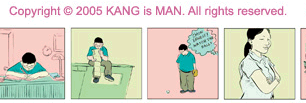|
I made “The Motel” to explore that awkward age when puberty
kicks in and suddenly everything has a charged sexual undercurrent. The
inspiration for the setting came when I asked myself where would be the
worst possible place to put a boy at that age? The answer --
surrounded by the darkest crevices of the world of sex, a sleazy hourly-rate
motel. My own awful memories of adolescence were embodied in the
character of Ernest, a chubby thirteen-year-old kid with hormones running
out of control. I have always been fascinated with the idea of rites of passage in contemporary
America. I created the character of Sam Kim out of the idea of
what kind of knowledge I could impart to a boy who was on the road to
manhood. I realized that if I had the opportunity to teach a child,
I wouldn't do any better than the completely dysfunctional and misguided
Sam Kim.
The central struggle between Ernest and his mother Ahma revolving around
a story Ernest has written came from wanting to show how not only is
it a burgeoning manhood that threatens the relationship between child
and parent, but the idea of a child truly expressing oneself. The reality
of Ernest becoming a full person separate from his mother is the most
threatening aspect of their struggle. Ultimately, both his mother and
he just want to be loved but neither is equipped to give it.
My goal in the direction was to maintain a sense of intimacy while giving
the story an epic quality. I look to films like “400 Blows” or “My
Life As A Dog” as models for this tone. This perspective
mirrors the way life feels at thirteen – everything is mythic in
its proportions.
Though this is an “Asian American” film, I think what was
always most important to me was the idea that the narrative had to be
solid in its craft. I have seen too many "ethnic” films
that become didactic or forsake story for politics (or worse the story
is the politics!). “The Motel” strives for a
similar aesthetic and balance as films like “Star Maps” and “Smoke
Signals.” Though the film is unapologetically culturally
specific, it is only as successful as it is rooted in showing complex
characters and telling a complete story.
Most important to me in making this film is to maintain the sense of
humor of the story. I have always found humor the most effective
way to get a point across. In “The Motel,” the delicate
balance in the crafting of the comedy comes from having the humor directly
connected to the humanity and vulnerability of the characters. Hopefully,
by using comedy, I can gently push the audience to uncomfortable areas
they had not anticipated and discover things about themselves. |
















